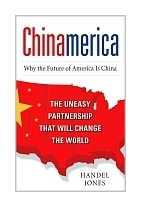|
||
• wydawnictwa polskie
• Zamów informacje o nowościach z wybranego tematu • kontakt
• Cookies na stronie |
CHINAMERICA: THE UNEASY PARTNERSHIP THAT WILL CHANGE THE WORLDJONES Hwydawnictwo: MCGRAW-HILL , rok wydania 2010, wydanie Icena netto:
Conventional wisdom pits China against the United States in a war for
economic supremacy. However, in ChinAmerica, Handel Jones, one of the leading experts on
China's industrial and economic emergence, demonstrates that the wave of the future is
cooperation between the two titans, not conflict-and how America will benefit from
increased economic engagement and competition with China. To some, conflict between China and the United States appears to be both imminent and unavoidable (indeed, in some eyes, the battle has already begun). But this perspective badly overlooks one vital fact: both nations have no choice other than to act in their mutual interest. Focusing on several key areas of conflict and mutual interest, Jones gives a thorough and eye-opening portrait of the policies, history, and habits that have led to the intersecting fortunes of the two superpowers. Jones also outlines actions the United States must take to hold on to its leadership role by forging equilibrium with China that's based on mutual respect and dependence. As Jones makes clear, the contrast between the two powers couldn't be more startling: while China is amassing through trade nearly one-fourth of the world's foreign exchange reserves (nearly three-fourths of that amount in USD), the United States excels mostly as a consumer of finished goods, with Americans unconcerned about debt and other consequences of living beyond their means. China subsidizes development of more efficient manufacturing techniques, and in response America threatens protectionist barriers. Developments such as these, however, don't necessarily put the nations on a collision course. To Jones, these facts point to a very real opportunity for Chinese and American governments and businesses to work together rather than be separated by economic tensions. Filled with cogent analysis and expert advice, ChinAmerica is the most comprehensive look yet at the interdependency of the world's two leading powers. This is a book that will change minds about Sino-American relations. Handel Jones is the founder, owner, and CEO of International Business Strategies, Inc., a market and strategy consulting and analysis company whose client list includes IBM, Nokia, Samsung, Sony, Toshiba, TSMC, and China Resources. He has been involved with Chinese governments and state-owned and private businesses for more than 30 years, and he is one of the leading experts in directing international business investment in China and Chinese corporate investment/expansion overseas. He lives in Los Gatos, California. Table of Contents Chapter 1. Generating Wealth Through Strength (China and U.S. Wealth Generation Perspective, Operating Structures of U.S. and China, Roles of Corporations in Building Wealth, Competitiveness and Marketing Positioning, Threats to U.S. Position); Chapter 2. U.S. The Waking Giant (Introduction, Perspective on U.S. Industry, Role of Government in U.S. Industrial Arena, Industrial Decisions Affected by Politics, Weak Support of Capital-Intensive Industry, Outsourcing of Manufacturing, Support Infrastructure Around Core Industries, Decline of Research Centers, Effect of Foreign-Born Leaders on U.S. Industries, Global Leadership of U.S. Corporations, Competitive Threats, Use of Profits, Key Trends for Wealth of U.S.); Chapter 3. Growth of Industry and Wealth in China (Reality or Illusions of China, What is China Today, Historical Perspective of China, Top-Level Guidance of Business Growth by the Govenment, Industry Progressions in China, Role of Electronics Industry in the Growth of China, Automotive Industry Case Study, Strategic Implications of Growth, Key Challenges Affecting Wealth); Chapter 4. Taiwan and Its Synergy with China (History, Competitiveness in Global Markets, Strategic Factors for Semiconductor Industry, Role of Contract Manufacturers (EMS Companies) and ODMs in Building Electronics Industry, Taiwan's Industrial Base and Impact on Electronics Industry in China); Chapter 5. Rise and Decline of Japan (Introduction, Protection of Japanese Governments and Industries, Employment Priorities and Decision Processes, Market Positioning, Quality-Based Competitive Advantages, Consumer Electronics Industry, Computer Industry, Communications Industry, Semiconductor Industry, Automotive Industry, Future Trends); Chapter 6. Factors That Will Allow Wealth to be Generated in Future (Overview,
Leadership, Control, and Management, Role of Creativity, Access to Raw Materials, Access
to Required Funding, Distribution of Wealth, A Cohesive Society, Efficient
Infrastructures, Strong Corporations in Multiple Industries, Strategies for Building
Wealth, Why China Will Strengthen and U.S. Will Weaken) Księgarnia nie działa. Nie odpowiadamy na pytania i nie realizujemy zamówien. Do odwolania !. |


